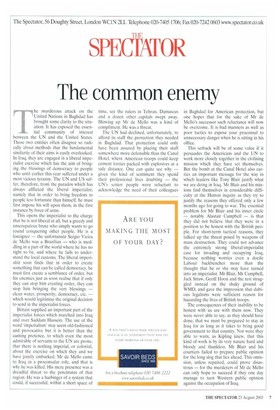SPECTATOR
The common enemy
The murderous attack on the United Nations in Baghdad has brought some clarity to the situation. It has exposed the essential community of interest between the UN and the United States. Those two entities often disagree so radically about methods that the fundamental similarity of their aims is easily overlooked. In Iraq, they are engaged in a liberal imperialist exercise which has the aim of bringing the blessings of democracy to people who until earlier this year suffered under a most vicious tyranny. The UN and US suffer, therefore, from the paradox which has always afflicted the liberal imperialist, namely that in order to bring freedom to people less fortunate than himself, he must first impose his will upon them, in the first instance by force of arms.
This opens the imperialist to the charge that he is not liberal at all, but a greedy and unscrupulous brute who simply wants to go round conquering other people. He is a foreigner — the unfortunate Sergio Vieira de Mello was a Brazilian — who is meddling in a part of the world where he has no right to be, and where he fails to understand the local customs. The liberal imperialist soon finds that in order to create something that can be called democracy, he must first create a semblance of order, but his enemies just as soon realise that if only they can stop him creating order, they can stop him bringing the very blessings — clean water, prosperity, democracy, etc. — which would legitimise the original decision to send in the imperialist forces.
Britain supplied an important part of the imperialist forces which marched into Iraq and over Saddam Hussein. The use of the word 'imperialism' may seem old-fashioned and provocative but it is better than the canting pretence, to which even the most admirable of servants to the UN are prone, that there is nothing imperial, or colonial, about the exercise on which they and we have jointly embarked. Mr de Mello came to Iraq in a proconsular role, and that is why he was killed. His mere presence was a dreadful threat to the potentates of that region. He was a harbinger of a system that could, if successful, within a short space of
time, see the rulers in Tehran, Damascus and a dozen other capitals swept away. Blowing up Mr de Mello was a kind of compliment. He was a threat.
The UN had declined, unfortunately, to afford its staff the protection they needed in Baghdad. That protection could only have been assured by placing their staff somewhere more defensible than the Canal Hotel, where American troops could keep cement lorries packed with explosives at a safe distance. One can quite see why — given the kind of sentiment they spend their professional lives doubting — the UN's senior people were reluctant to acknowledge the need of their colleagues in Baghdad for American protection, but one hopes that for the sake of Mr de Mello's successor such reluctance will now be overcome. It is bad manners as well as poor tactics to expose your proconsul to unnecessary danger when he is sitting in his office.
This setback will be of some value if it persuades the Americans and the UN to work more closely together in the civilising mission which they have set themselves. But the bomb at the Canal Hotel also carries an important message for the way in which leaders like Tony Blair justify what we are doing in Iraq. Mr Blair and his minions find themselves in considerable difficulty at the Hutton inquiry as they try to justify the reasons they offered only a few months ago for going to war, The essential problem for Mr Blair and his inner circle — notably Alastair Campbell — is that they did not believe that they were in a position to be honest with the British people, For short-term tactical reasons, they talked up the threat posed by weapons of mass destruction. They could not advance the extremely strong liberal-imperialist case for invading and occupying Iraq, because nothing worries even a docile Labour backbencher more than the thought that he or she may have turned into an imperialist. Mr Blair, Mr Campbell, Jack Straw, Geoff Hoon and the rest struggled instead on the shaky ground of WMD, and gave the impression that dubious legalisms were sufficient reason for hazarding the lives of British troops,
The consequences of their inability to be honest with us are with them now. They were never able to say, as they should have done, that we must be prepared to stay in Iraq for as long as it takes to bring good government to that country. Nor were they able to warn, as Kipling knew, that this kind of work is by its very nature hard and bloody and thankless. Mr Blair and his courtiers failed to prepare public opinion for the long slog that lies ahead. This omission, unless repaired, could prove disastrous — for the murderers of Mr de Mello can only hope to succeed if they one day manage to turn Western public opinion against the occupation of Iraq.


























































 Previous page
Previous page